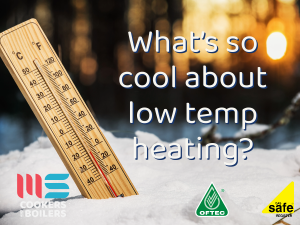As we seek ways to reduce our carbon footprint and save on energy costs, low temperature heating (LTH) systems have emerged as a promising solution. But what does this mean, and how can it benefit you and the environment?
Put simply, low temperature heating involves warming your home to a comfortable temperature using a relatively cool heating system. By doing this you can achieve a more even and consistent heat distribution throughout your living spaces. This means enhanced efficiency, eco-friendliness and cost effectiveness for your home.
How does low temperature heating work?
In traditional heating systems, water temperatures typically range from 75°C to 85°C. Even most combi boilers, straight from the manufacturers, are set to heat water for central heating to around 70°C. This means that many of our boilers aren’t condensing properly or working as efficiently as they could be. On the other hand, low temperature heating aims to set the water temperature between 35°C and 55°C. By doing this, your boiler or heat pump doesn’t need to work as hard to achieve the desired output temperature. You can find out more about how LTH systems work from HeatGeek.
What are the benefits of low temperature heating?
The benefits of LTH systems are wide-ranging:
Lower Energy Consumption: In a well-designed and properly insulated system, low temperature heating can reduce energy consumption by approximately 30%. Not only contributing to a healthier planet but also substantial savings on your household budget.
Unmatched Comfort: Low temperature radiators possess the ability to quickly and precisely adapt to changes in temperature. Consequently, the room being heated remains consistently at your desired temperature, with heat evenly distributed throughout the space. Say goodbye to cold spots and hello to ultimate comfort!
Energy Source Variability: Transitioning to low temperature heating doesn’t mean an immediate switch to a sustainable heating source. You can happily continue using your combi gas or oil boiler. However, if you’re ready to make the shift to renewable or sustainable energy, your heating system is ready too!
Extended Material Lifespan: Thanks to the steady and lower temperature ultimately characteristics of LTH, the components of your heating system are subjected to less stress and therefore have a longer lifespan. This means fewer engineer visits, replacement parts and repair bills.
Practicality at its finest: With low temperature heating you can say goodbye to days of adjusting the thermostat when you go to bed or turning it off when you pop to the shops. In fact, the only time you’ll need to make adjustments is if you’re away for an extended period, such as during holidays.
What does my home need to implement low temperature heating?
Insulation: Proper insulation is crucial to creating a warm and cosy atmosphere while significantly reducing your energy consumption. Ensuring your home is well insulated sets the foundation for an effective LTH system.
Suitable Heat Source: To achieve low temperature heating you’ll need a compatible heat source. Options range from low temperature boilers, heat pumps and even solar powered boilers. While heat pumps require a larger initial investment compared to standard combi boilers, they are the most energy efficient choice in the long run.
Large Radiators or Heating Elements: Most radiators can reach the necessary temperature for low temperature heating, maximising heat transfer to ambient air requires large surface area heating elements. There are several options are available including; LTH radiators, wall or underfloor heating, or an air heat pump.
At MS Cookers and Boilers, we are passionate about providing you with the knowledge and expertise to make informed decisions when it comes to designing your heating system. Our goal is to empower you to embrace the future of home heating with confidence.
Don’t miss the opportunity to enhance your comfort, reduce your energy consumption, and contribute to a more sustainable future. Contact us now to embark on a journey towards a warmer, greener, and more cost-effective home heating experience. Together, let’s revolutionise the way we heat our homes for generations to come.

